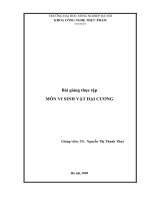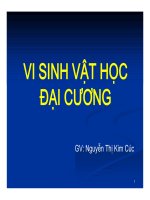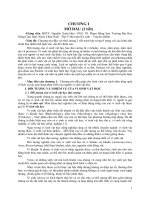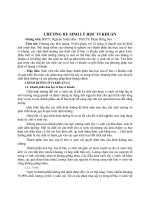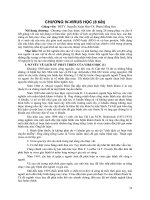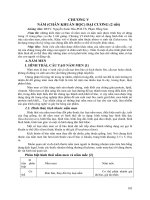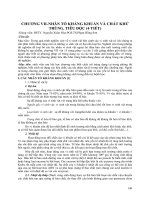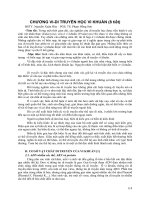Vi sinh vật đại cương tiếng Anh
Bạn đang xem bản rút gọn của tài liệu. Xem và tải ngay bản đầy đủ của tài liệu tại đây (370.59 KB, 1 trang )
<span class='text_page_counter'>(1)</span>SH01002 GENERAL MICROBIOLOGY (VI SINH VẬT ĐẠI CƯƠNG) (Credits 2: lecture 1,5; practice: 0,5; self-study 6) EXPECTED LEARNING OUTCOME Course objective. Expected learning outcomes of program. COURSE EXPECTED LEARNING OUTCOMES After successfully completing this course, students are able to:. Knowledge ELO3. CELO1. Evaluating the role and potential of microorganisms in life.. CELO2. Distinguishing the main groups of microorganisms according to the morphological characteristics and, cell structure, growth, development and distribution of the cell.. ELO3. CELO3. Analyze the effects of environmental conditions on the growth and development of microorganisms.. ELO3. Work in groups and organize working groups to discuss, analyze, write and present scientific reports.. ELO7, 8. Skills CELO4. Proficient use of the microscope and basic equipment in microbiological practice, mastering microscope CELO5 templates. Personal autonomy and responsibility CELO6. Proactively study and raise awareness of self-study, humility, serious working style, high sense of responsibility.. STUDENT TASKS • Attendance: Students are required to attend at least 75% of the total theory lectures of the course. •Preparation for the lecture: Students are required to read lecture notes, text books and references before attending the class, according to the learning plan of the module that the teacher announced. • Group discussion and presentation: Students are required to engage in group discussion. •Mid-term exam: Students miss a mid-term will be given a mark of zero. •Final exam: Students must take the final exam and meet requirements. •For online learning: Students need to install online learning software and fulfill the requirements for online learning.. ELO11. ELO15. CONTENT Chapter 1: Introduction and general understanding of microorganisms; Chapter 2: Viruses; Chápter 3: Bacteria; Chapter 4: Eukaryotes: yeasts, fungi and protozoa; Chapter 5: Microbial nutrition and growth Colloidal chitin. Triacetylchitotriose. Diacetylchitobiose. ASSESSEMENT METHODS • Grade: 10 marks • The average mark of the course is the sum of the rubric marks after multiplied by the respective ratio of each rubric • Attendance: 10% • Mid-team exam: 30%, writing or test quiz. • Final exam/: 60%: writing or test quiz. TEACHING METHODS Do lecturing Use videos related to the curriculum Group discussion Online-Teaching. LEARNING METHODS •Read lecture notes, books and references before attending the class. •Students are required to listen to lectures in class and perform other learning activities such as solving practice problems after class. •Prepare and actively participate in discussion.. LECTURERS 1. Nguyen Van Giang, Acc.Prof. (0986383847, ). 2. Tran Thi Hong Hanh, MSc. (0988029388, ) 3. Nguyen Thanh Huyen, MSc, (0966201281, ).
<span class='text_page_counter'>(2)</span>
